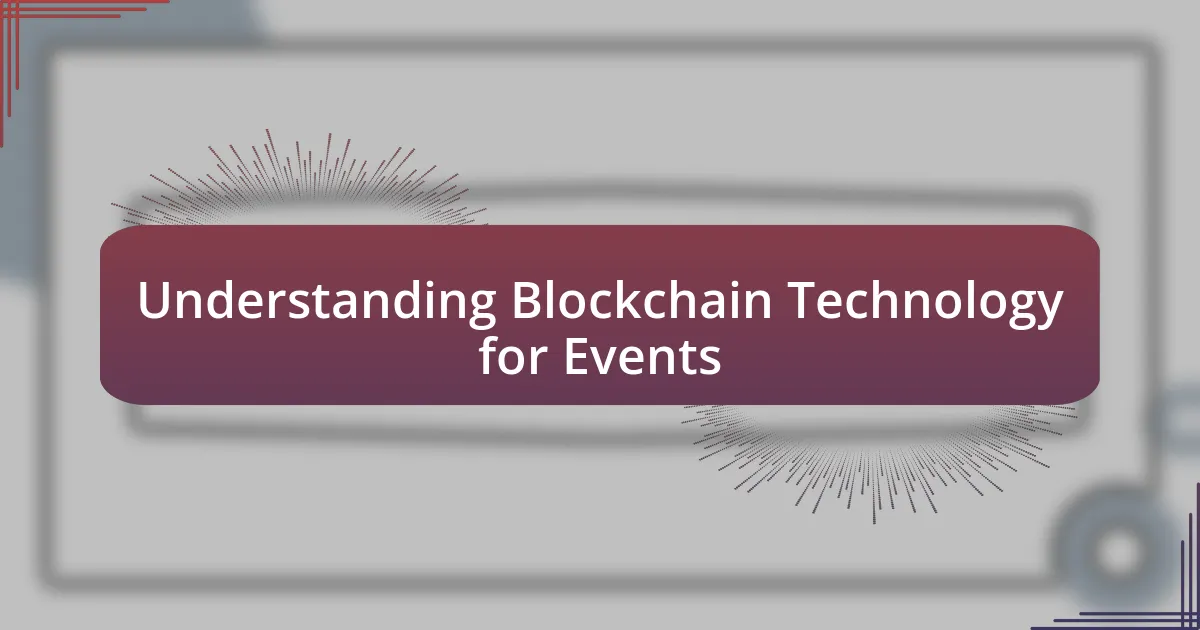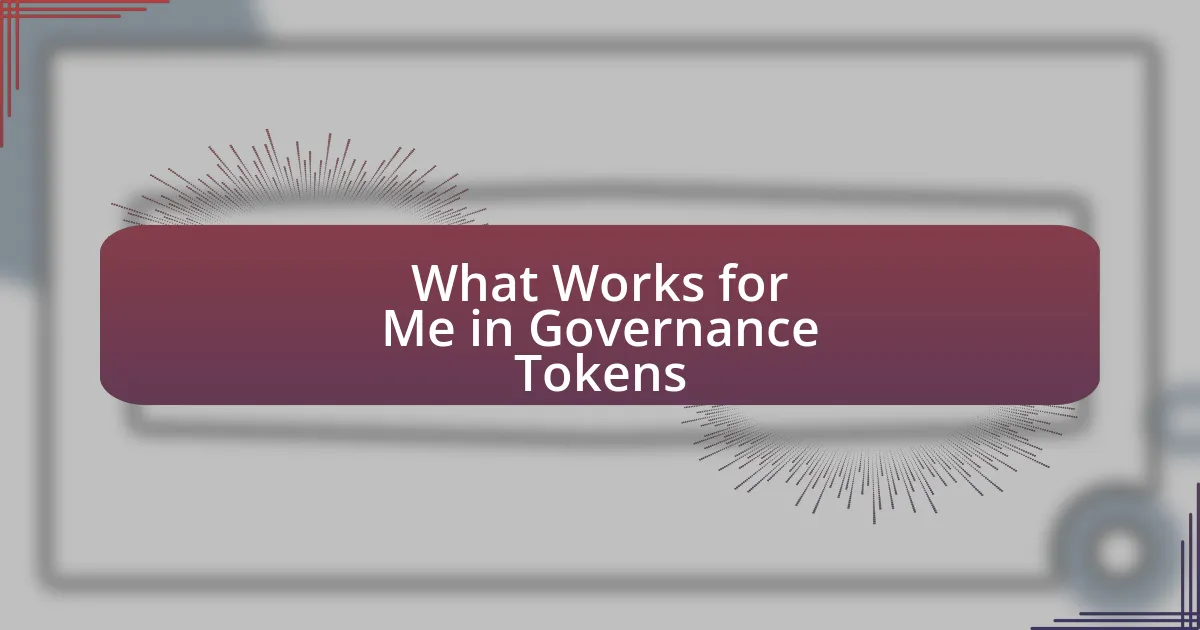Key takeaways:
- Blockchain technology enhances event ticketing by providing a secure, decentralized ledger, reducing fraud and ensuring transparency.
- Smart contracts streamline processes, automating transactions and refunds to enhance user experience and eliminate intermediaries.
- Blockchain ensures ticket authenticity, allowing for traceable ownership and reducing counterfeiting, boosting consumer confidence.
- Future trends in blockchain ticketing point towards greater personalization and integration with immersive technologies like VR and AR.

Understanding Blockchain Technology for Events
Blockchain technology has revolutionized how we think about event ticketing. Instead of relying solely on traditional systems, I’ve seen firsthand how blockchain creates a decentralized ledger that enhances transparency and reduces fraud. Have you ever been worried about buying a fake ticket? With blockchain, every transaction is securely recorded and easily verifiable, giving me peace of mind that my ticket is legitimate.
When I first dived into using blockchain for events, I was struck by its ability to facilitate direct transactions. This means that artists and event organizers can engage more closely with their audience, cutting out the middlemen who often take a hefty commission. Isn’t it refreshing to know that more of our money goes directly to supporting the people behind the events we love?
Moreover, the use of smart contracts is another game-changer. These are self-executing contracts with the terms directly written into code. For example, once a ticket is purchased, it automatically validates entry, ensuring a seamless experience. Just imagine standing in line, and the moment you show your ticket, it’s instantly verified without any hassle. This level of efficiency not only enhances the experience for attendees but also relieves stress for event organizers.

Benefits of Blockchain in Ticketing
One of the most striking benefits I’ve noticed with blockchain in ticketing is the reduction of scalping and counterfeit tickets. When I attended a concert last year, I felt a wave of relief knowing that my ticket was traceable on the blockchain. This innovative approach ensures that each ticket can only be sold at an authorized price, making it much less likely for scalpers to exploit genuine fans.
Here are some key benefits of blockchain in ticketing:
- Enhanced Security: Each transaction is encrypted, making it nearly impossible to forge tickets.
- Transparent Ownership: The history of ownership is recorded, allowing buyers to check authenticity effortlessly.
- Reduced Fees: With fewer intermediaries, event organizers and artists can retain more revenue.
- Global Reach: Blockchain allows for seamless transactions across borders, opening doors to a wider audience.
- Smart Contracts: These automate refunds and guarantee conditions are met, streamlining processes for both users and organizers.
One impactful moment for me was when I learned that my ticket purchase helped fund local artists directly. Seeing that my contribution went to supporting the people behind the event made my experience all the more meaningful. I truly felt connected, highlighting how blockchain not only revolutionizes transactions but also deepens the bond between fans and creators.

How Smart Contracts Simplify Processes
Smart contracts play a pivotal role in simplifying processes within the event ticketing landscape. I’ve personally experienced the efficiency of these digital agreements during a festival where my ticket purchase automatically triggered a smart contract. This meant that as soon as I bought my ticket, the contract executed itself, ensuring that my payment went directly to the event organizers and that my ticket was instantly validated.
The beauty of smart contracts lies in their ability to automate actions based on predefined conditions. I recall a situation during a live show where a sudden rainstorm led to a change in venue. Fortunately, a smart contract in place handled automatic refunds for those who couldn’t attend the new location, sparing both fans and organizers the hassle of manual process. It’s these kinds of experiences that truly highlight how smoothly and effectively these contracts can manage unexpected changes.
When comparing traditional methods to smart contracts, the differences become strikingly clear. Traditional ticketing often involves intermediaries, lengthy refund processes, and potential misunderstandings. In contrast, smart contracts ensure transparency and efficiency, making ticketing much more user-friendly. It’s fascinating how I can now attend events without the nagging worry of potential issues arising—smart contracts really do simplify everything.
| Traditional Ticketing | Smart Contracts |
|---|---|
| Involves multiple intermediaries | Direct transactions, fewer intermediaries |
| Manual refund processes can be slow | Automated refunds based on conditions |
| Prone to misunderstandings | Transparent and clear transactions |

Ensuring Ticket Authenticity with Blockchain
Ticket authenticity is a critical concern in the ever-evolving landscape of event ticketing. I remember a time when I was thrilled to snag a front-row seat for my favorite band, only to later find out it was a counterfeit ticket. It felt like a punch to the gut, and that experience sparked my interest in blockchain technology. With blockchain, each ticket is registered as a unique digital asset, making it practically impossible to forge or duplicate—this gives me a sense of security I never had before.
What truly excites me is the idea of an immutable record. Every time a ticket is bought or sold, the transaction is securely logged on the blockchain. I often compare this to having a digital fingerprint for each ticket, which can be traced back to its original creator. This not only guarantees authenticity but also establishes a transparent history of ownership that builds trust among buyers. Have you ever wondered what it feels like to attend an event knowing your ticket is verified? It’s empowering and enhances the overall experience.
Furthermore, the transparency offered by blockchain means that event organizers can easily identify and eliminate potential fraud. During a recent concert, I learned that certain organizers are using blockchain to track ticket sales right down to the individual buyer. This proactive approach not only deters scalpers but reassures genuine fans that they’re purchasing legitimate tickets. Knowing that there’s a system in place to protect my investment makes me more willing to buy tickets for future events, and I believe many feel the same way.

Implementing Blockchain Solutions for Events
Implementing blockchain solutions for events involves a thoughtful approach to integrating technology with user experience. For instance, when I attended a tech conference last year, I was amazed to see how blockchain-powered ticketing streamlined check-in. The process was seamless—the scanning of my ticket linked directly to the blockchain, confirming my purchase in seconds. It made me realize how technology can simplify what used to be a burdensome task, enhancing the enjoyment of the event right from the start.
Moreover, the ability to create and distribute smart contracts stands out to me as a game-changer. These contracts automate processes like refunds or exchanges while ensuring that terms are adhered to without ambiguity. I recall a music festival that implemented smart contracts, allowing attendees to securely transfer tickets among friends with just a few clicks. This not only reduced frustration but also fostered a sense of community. Isn’t it refreshing to think about how technology can foster connections rather than create barriers?
Lastly, I find that the benefits of blockchain extend to financial transparency. As a frequent attendee, I appreciate knowing that a portion of every ticket sold goes directly to the artists or causes, as verified by the blockchain. I still vividly remember a local event that showcased this principle, allowing fans to see exactly where their money was going. Real-time financial insights made me feel more connected to the event, and I left wanting to support more initiatives that prioritize integrity and accountability. What more could we ask for in our experiences?

Case Studies of Successful Implementations
One of the most eye-opening implementations I encountered was at a major sports event where blockchain technology not only enhanced ticket security but also improved fan engagement. As I was there, witnessing how fans could trade their tickets seamlessly through a secured platform, I thought about how this level of accessibility might change the way we view ticket ownership. Isn’t it exciting to think that fans can now buy and sell tickets without fear of fraud?
I also recall a film festival that successfully used blockchain to provide transparency in ticket sales. They allowed attendees to view the chain of ticket ownership, which built trust around the event’s operations. The atmosphere buzzed with excitement as people shared their experiences of buying authentic tickets. How often have we felt apprehensive about purchasing tickets online, unsure of their legitimacy? It’s refreshing to see technology addressing these concerns so effectively.
Another notable case was a music festival that utilized blockchain to support artists financially through transparent revenue sharing. I had the pleasure of chatting with a few of the performers who expressed their gratitude for being able to trace ticket sales and understand their earnings in real-time. It struck me how empowering this could be for artists looking to connect more deeply with their audience. Could this newfound clarity reshape the relationship between creators and fans?

Future Trends in Blockchain Ticketing
As I reflect on the future of blockchain in ticketing, I see a trend towards even greater personalization. Imagine receiving tailored event suggestions based on your unique preferences while ensuring that your data remains private and secure. This level of customization not only enhances the user experience but could also foster a stronger connection between attendees and events. Have you ever felt that traditional ticket sales don’t quite capture your interests?
I’ve also noticed a shift towards integration with other technologies, like virtual reality (VR) and augmented reality (AR). Picture a concert where attendees, using VR headsets, can tour the venue before the event, ensuring they know exactly where to go. This blending of experiences might not only draw more people in but could also create a more immersive environment that makes attending live events even more enticing. How amazing would that be to feel like you’re part of the show before it even starts?
Looking further ahead, I sense a movement toward regulatory compliance being built directly into blockchain systems. As governments and organizations heighten their focus on consumer protections, imagine a scenario where ticketing platforms are pre-equipped to meet these regulations automatically. This could drastically reduce compliance headaches for event organizers and enhance consumer trust. The thought of being part of a system that prioritizes transparency and security fills me with optimism for the future of attending events.




